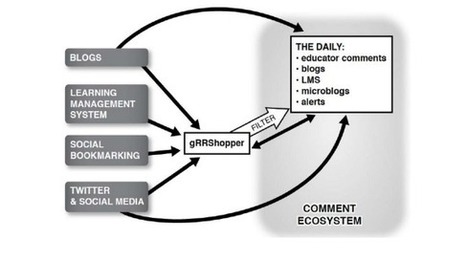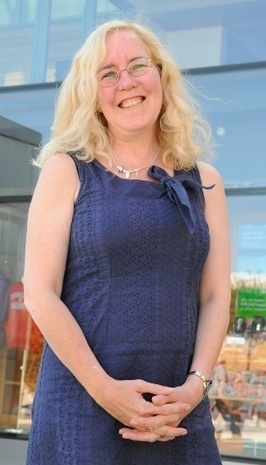This MOOC is a Connectivist environment. We see learning not just as phycological or neurological or even social processes. Learning is also change, generative thinking, new norms, creating artifacts, and making meaningful human connections. Learning is collective action.
Get Started for FREE
Sign up with Facebook Sign up with X
I don't have a Facebook or a X account

 Your new post is loading... Your new post is loading...
 Your new post is loading... Your new post is loading...
Coursera will partner with a dozen top-rank US colleges to offer more than 100 courses starting this autumn.
"MOOCs will also attract ‘glocal’ students with global aspirations and local experiences. ‘Glocals’ represent the segment of students who typically seek transnational education, including international branch campuses, twinning arrangements and online education."
"Branch campuses are not going away in the short term, especially the ones that have been in existence for a while. However, newer branch campuses will face unexpected competition from MOOCs. In a world of Amazon and e-books, starting a bookstore is a folly. Likewise, institutions expecting to start or expand full-fledged campuses in times of disruptive online learning models need to think twice about their internationalisation strategies."
I’d like to suggest a great MOOC that has been around for years. It is “massive” (nearly a half million members), it is open–as in free (anyone can join without cost), it is open–as in shareable (there is no copyright: all content by all contributors is in the public domain), it’s online (www.linuxquestions.org), and it provides over 200 “courses” (tutorials, resources and related discussions) across a variety of areas:
Elite US universities are making their classes available for free online. Jessica Moore asks why.
Elite US universities are known globally for their excellent standards of education, and for their astronomical course fees. At Harvard, the full whack for an undergraduate programme is around $60,000 a year. For all the current anxiety in the UK, that makes our new £9,000-a-year maximum look like pocket money. But then, there’s no such thing as a free lunch.
TED Talks Daphne Koller is enticing top universities to put their most intriguing courses online for free -- not just as a service, but as a way to research how people learn.
Each keystroke, comprehension quiz, peer-to-peer forum discussion and self-graded assignment builds an unprecedented pool of data on how knowledge is processed and, most importantly, absorbed.
I’ve held back from giving an evaluation Coursera preferring to wait until I completed an entire course, which I did recently, Introduction to Sociology, which closed on July 20th. This course had 40,000 students enrolled which is consistent with enrollment for a MOOC, though the number of students completing both exams I’m sure was far lower. If you are not familiar with Coursera, Coursera is a joint effort to offer free undergraduate level courses, which are Open, Online, and Massive, a.k.a. MOOCs, by Princeton, University of Michigan, Stanford, and University of Pennsylvania. Recently Coursera, received additional funding and signed on several more university partners including a selection of foreign schools, the University of Edinburgh in Scotland, the University of Toronto, and a technical university in Switzerland.
In this post I’ll outline why I think Coursera has promise and potential, but not necessarily as a ‘fix’ for Higher Ed, but more for the promise it holds to meet other educational needs, other gaps that have yet to be addressed [or discussed for that matter]. And though Coursera has the right formula for bringing online education to the masses – with its sophisticated and user-friendly platform that could morph into a fix for Higher Ed, I think the potential goes further. Though perhaps radical given the perceived current crisis at hand in Higher Ed, why not explore how MOOCs can meet educational needs at a different level?
“There is no doubt in my mind that in just a few years the entire online space is going to be very different,” says Arthur Kirk, the president of Saint Leo University, which enrolls about 3,000 online students. “And while the MOOCs aren’t, in my mind, an immediate threat, it’s just one of a number of things that are going to transform the entire space.”
A survey of technology used in some MOOCs, identifying trends and possible future directions.
The conclusion; more shared guidance on aggregation architectures might be needed.
From
hastac
I am sure we need more data here but this early demographic report explodes the idea that most students taking MOOC's live in Third World countries, are taking programming courses, and their success at those courses makes them ripe for a world-wide employment agency to which companies like Google might turn for outsourcing cheap code at low cost, without benefits, and on a piece-work basis.
That still happens to be true, by the way, for many excellent coders around the world, especially from the Third World, who take programming courses on line but this new survey opens up a whole new idea of the audience for MOOCs and, to my mind, has very interesting sociological implications and educational ones.
Everyone has an opinion about online education and Massive Open Online Courses (MOOCs, a term I grow weary of with each refresh of Google Reader). Naturally, some are good, some are bad, most are the same arguments recycled and tweaked.
I have trudged through two weeks of higher education online education development stories to bring you this roundup with teaser summaries. Enjoy.
In his recent JISC blog, David Kernohan asks: ‘Why bother paying inflated fees to attend university? …What if you could get it all for free, online?’ Of course, it is tongue in cheek, because as my title above suggests, you don’t get something for nothing.
Presentation to HEA/SEDA conference on First Steps into Learning and Teaching in Higher Education (FSLT12) massive open online course (RT @georgeroberts: Made webinar with @slideshare from slides & audio of talk at #hea #seda #oer conference on... Via Dr. Susan Bainbridge |
Daphne Koller, one of the two founders of Coursera, describes some of the key features of the Coursera MOOCs, and the lessons she has learned to date about teaching and learning from these courses. The video is well worth watching, just for this.
However I’m probably going to suffer the same kind of fate of the Russian female punk band, Pussy Riot, by spitting on the altar of MOOCs, but this TED talk captures for me all that is both right and wrong about the MOOCs being promoted by the elite US universities.
Institutions “are being challenged to keep costs down, to keep higher education relevant to changes in the job market, to keep faculties up to date, and to adopt new technologies. While the best-managed of these institutions will rise to the challenge, many will not. Students should be wary.”
There is so much to like about the concept of Massive Open Online Courses (MOOCs) that it is easy to understand why they are taking the higher ed world by storm (Dunn, 14 July, 2012).
An online degree-granting institution called World Education University, set to open this fall, plans to try an advertiser-driven model to support its free content
This is a public MOOC running in September of 2012 focused on the use of Design Thinking as a method for creative problem solving, product or service development, and infinite shenanigans. Let's have some fun and do some great things at the same time!
From
prezi
KF: A Prezi emerging from Goldsmiths Learning Enhancement Unit that offers and overview of MOOC and the variations that are apparent in those offered to date. Considers pedagogy, design, administration and their relationship to existing higher education structures and processes. Informative even in the absence of a presenter.
George Siemens, who leads Athabasca University’s Technology Enhanced Knowledge Research Institute, makes the case for why colleges should experiment with inviting tens of thousands of students to participate in their courses free online. Since the Tech Therapy team conducted the interview last year, the model has caught on with many well-known universities. 
dianataylor's comment,
August 2, 2012 10:45 PM
This is an audio resource, at 6 min he references "learner self organisation".. learners creating sub-networks via social media, key message being that the learner takes control of the method and process of which they learn. There is reference to connectivism philosophies at 8 min as a way of addressing learner support minimising tutor facilitation. Discussion continues confronting the why do we need a brick and mortar uni then idea... at 10:30 George saya that higher ed is exploring what it might look like in the future - fair call see where the hype takes us, needs to be tried and tested :)
It’s easy to see a MOOC (a massive, online, open course, like the ones offered by Coursera or MITx) as a digital-age version of a correspondence course. An instructor posts some lecture videos, students watch those videos, and then students submit homework for grading. And some MOOCs probably work that way. But that simplistic view of a MOOC misses the kinds of community interactions described above. And those interactions, ones where students continue learning after a course is over, ones where they build things to contribute to the learning community, are signs that some MOOCs are much more than correspondence courses.
So it’s wrong to tar MOOCs with a broad brush, and maybe tarring them at all may be more premature and pre-emptive than helpful (rather like David Brooks claim that they are a “Campus Tsunami“) . The buzz around MOOCs is not that of killer bees, but some skepticism is warranted, as is some sustained thought about the different (as in various, multiple) possibilities and purposes they might present.
I am very excited to be part of a team developing a Learning Design Massive Open Online Course (MOOC), which will be delivered in October 2012. As part of our preparation for this I attended a workshop at the OU last week. This blog post describes the outputs produced in the team I was part of which consists of myself, Ale Armellini and Anna Page.
Anyone with a Moodle site can offer a MOOC: two fundamental questions we need to ask are How do we make it effective for learners? and How do we make it a meaningful and worthwhile activity for the organiser / provider? This post focuses on the second question, which relates to the need for educational offerings to be sustainable for the provider.
Because MOOCs are unlikely to incorporate a high level of learner support and rigorous assessment, they will not be appropriate for all students in all contexts.
For those who follow the higher education news, the week of July 16th to 22nd will stand out as one in which the term “MOOC” (Massive Open Online Courses, for the uninitiated) hit a high point as the “higher-ed buzzword of the year”. Unwitting readers have been swept up by a tidal wave of MOOC rhetoric, finding themselves clobbered with dubious metaphors of uncontrollable, inevitable force; they have seen the rhetorical dial turned up to 11, moving beyond the level of “game-changer” and “disruption” and into the realm of the “revolutionary” and even the seismological. |































